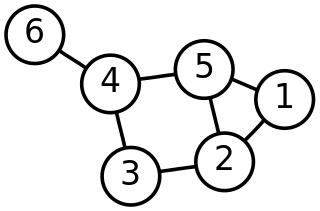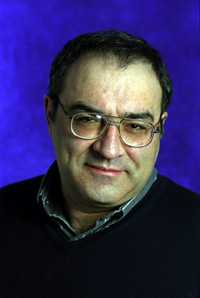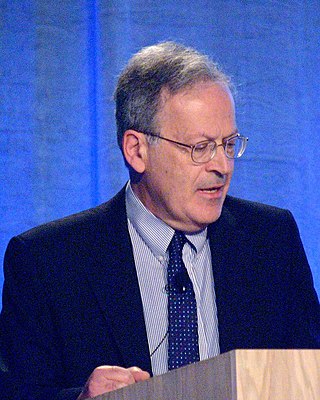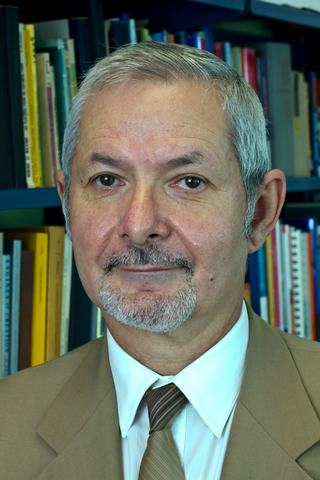Related Research Articles

Discrete mathematics is the study of mathematical structures that can be considered "discrete" rather than "continuous". Objects studied in discrete mathematics include integers, graphs, and statements in logic. By contrast, discrete mathematics excludes topics in "continuous mathematics" such as real numbers, calculus or Euclidean geometry. Discrete objects can often be enumerated by integers; more formally, discrete mathematics has been characterized as the branch of mathematics dealing with countable sets. However, there is no exact definition of the term "discrete mathematics".
A randomized algorithm is an algorithm that employs a degree of randomness as part of its logic or procedure. The algorithm typically uses uniformly random bits as an auxiliary input to guide its behavior, in the hope of achieving good performance in the "average case" over all possible choices of random determined by the random bits; thus either the running time, or the output are random variables.

Leonid Genrikhovich Khachiyan was a Soviet and American mathematician and computer scientist.
The Gödel Prize is an annual prize for outstanding papers in the area of theoretical computer science, given jointly by the European Association for Theoretical Computer Science (EATCS) and the Association for Computing Machinery Special Interest Group on Algorithms and Computational Theory. The award is named in honor of Kurt Gödel. Gödel's connection to theoretical computer science is that he was the first to mention the "P versus NP" question, in a 1956 letter to John von Neumann in which Gödel asked whether a certain NP-complete problem could be solved in quadratic or linear time.
The Fulkerson Prize for outstanding papers in the area of discrete mathematics is sponsored jointly by the Mathematical Optimization Society (MOS) and the American Mathematical Society (AMS). Up to three awards of $1,500 each are presented at each (triennial) International Symposium of the MOS. Originally, the prizes were paid out of a memorial fund administered by the AMS that was established by friends of the late Delbert Ray Fulkerson to encourage mathematical excellence in the fields of research exemplified by his work. The prizes are now funded by an endowment administered by MPS.
The graph isomorphism problem is the computational problem of determining whether two finite graphs are isomorphic.

Éva Tardos is a Hungarian mathematician and the Jacob Gould Schurman Professor of Computer Science at Cornell University.

Leslie Gabriel Valiant is a British American computer scientist and computational theorist. He was born to a chemical engineer father and a translator mother. He is currently the T. Jefferson Coolidge Professor of Computer Science and Applied Mathematics at Harvard University. Valiant was awarded the Turing Award in 2010, having been described by the A.C.M. as a heroic figure in theoretical computer science and a role model for his courage and creativity in addressing some of the deepest unsolved problems in science; in particular for his "striking combination of depth and breadth".
ACM SIGACT or SIGACT is the Association for Computing Machinery Special Interest Group on Algorithms and Computation Theory, whose purpose is support of research in theoretical computer science. It was founded in 1968 by Patrick C. Fischer.
In computational complexity, problems that are in the complexity class NP but are neither in the class P nor NP-complete are called NP-intermediate, and the class of such problems is called NPI. Ladner's theorem, shown in 1975 by Richard E. Ladner, is a result asserting that, if P ≠ NP, then NPI is not empty; that is, NP contains problems that are neither in P nor NP-complete. Since it is also true that if NPI problems exist, then P ≠ NP, it follows that P = NP if and only if NPI is empty.
In probability theory, the mixing time of a Markov chain is the time until the Markov chain is "close" to its steady state distribution.

Ravindran Kannan is a Principal Researcher at Microsoft Research India, where he leads the algorithms research group. He is also the first adjunct faculty of Computer Science and Automation Department of Indian Institute of Science.
Michael Stewart Paterson, is a British computer scientist, who was the director of the Centre for Discrete Mathematics and its Applications (DIMAP) at the University of Warwick until 2007, and chair of the department of computer science in 2005.
Mark Richard Jerrum is a British computer scientist and computational theorist.
Alistair Sinclair is a British computer scientist and computational theorist.
Alan M. Frieze is a professor in the Department of Mathematical Sciences at Carnegie Mellon University, Pittsburgh, United States. He graduated from the University of Oxford in 1966, and obtained his PhD from the University of London in 1975. His research interests lie in combinatorics, discrete optimisation and theoretical computer science. Currently, he focuses on the probabilistic aspects of these areas; in particular, the study of the asymptotic properties of random graphs, the average case analysis of algorithms, and randomised algorithms. His recent work has included approximate counting and volume computation via random walks; finding edge disjoint paths in expander graphs, and exploring anti-Ramsey theory and the stability of routing algorithms.
In the analysis of algorithms, several authors have studied the computation of the volume of high-dimensional convex bodies, a problem that can also be used to model many other problems in combinatorial enumeration. Often these works use a black box model of computation in which the input is given by a subroutine for testing whether a point is inside or outside of the convex body, rather than by an explicit listing of the vertices or faces of a convex polytope. It is known that, in this model, no deterministic algorithm can achieve an accurate approximation, and even for an explicit listing of faces or vertices the problem is #P-hard. However, a joint work by Martin Dyer, Alan M. Frieze and Ravindran Kannan provided a randomized polynomial time approximation scheme for the problem, providing a sharp contrast between the capabilities of randomized and deterministic algorithms.

Cristian Sorin Calude is a Romanian-New Zealander mathematician and computer scientist.
In discrete mathematics and theoretical computer science, reconfiguration problems are computational problems involving reachability or connectivity of state spaces.
Jin-Yi Cai is a Chinese American mathematician and computer scientist. He is a professor of computer science, and also the Steenbock Professor of Mathematical Sciences at the University of Wisconsin–Madison. His research is in theoretical computer science, especially computational complexity theory. In recent years he has concentrated on the classification of computational counting problems, especially counting graph homomorphisms, counting constraint satisfaction problems, and Holant problems as related to holographic algorithms.
References
- ↑ M.Dyer, A.Frieze and R.Kannan (1991). "A random polynomial-time algorithm for approximating the volume of convex bodies". Journal of the ACM. 38 (1): 1–17. doi: 10.1145/102782.102783 . S2CID 13268711.
- ↑ R. Bubley and M. E. Dyer (1997). "Path coupling: A technique for proving rapid mixing in Markov chains". Proceedings 38th Annual Symposium on Foundations of Computer Science. pp. 223–231. CiteSeerX 10.1.1.385.5367 . doi:10.1109/SFCS.1997.646111. ISBN 978-0-8186-8197-4. S2CID 18114361.